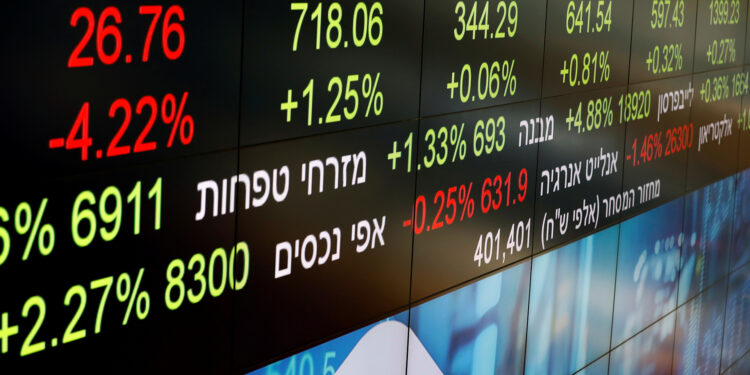The Israeli economy continues to bleed for nearly 11 months as the aggression on the Gaza Strip continues. Growth indicators, budget deficit and even inflation have not given any indication of the cohesion of economic performance in the midst of a crisis that has affected all sectors.
The Israeli economy contracted by 0.4% in the second quarter of 2024, measured by per capita GDP.
While Tel Aviv Stock Exchange analysts expected the Israeli economy to grow by 5.9% during the second quarter of 2024, the same rate expected by Bloomberg, the figures came in lower than expected, recording 1.2%.
The figures reflect the failure of the Israeli economy sectors to adapt to the consequences of the Gaza war, especially construction, agriculture, services and tourism, according to figures revealed by the Israeli Bureau of Statistics this week, amid expectations of more gloom for the remainder of the current year 2024.
One of the biggest decliners during the second quarter was the exports sector, which declined for the third consecutive quarter, recording a decline of 7.1%.
Fixed asset investment saw no growth in the second quarter, while imports, excluding defense, ships, aircraft and diamonds, contracted 7.3% year-on-year.
Much of the slowdown in fixed investment is due to a slump in the construction sector, which relies on Palestinian workers from the West Bank, who have been banned from entering Israel since the start of the war, Bloomberg reported.
The Israeli government was unable to fulfill its promise to replace them with other foreign workers, especially from India, Bangladesh and the Philippines, which made the sector lose all the elements of recovery.
While government consumption rose 8.2% compared to 2.6% in the previous quarter, the growth adds to concerns that economic growth has become overly dependent on high public spending, tied to war needs.
Financial deficit
Israel’s budget deficit continued to rise in July, reaching 8.1% of GDP over the past 12 months.
This percentage is equivalent to 155.2 billion shekels ($47.1 billion), according to the latest reports of the Finance Ministry’s Accountant General, Yali Rotenberg, in a statement issued by the ministry last week.
The fiscal deficit in the months ending last June was about 7.6% of GDP, while the Ministry of Finance expected the deficit to reach 6.6% of GDP, or about $34 billion.
These figures indicate that the budget deficit is constantly widening, making it difficult for Israel to bear the cost of the debts resulting from covering the deficit, especially with the rise in interest, on both the dollar and the shekel.
Israel’s public debt exceeds nearly 67% of GDP, compared to about 63% before the war on the Gaza Strip last October.
cost of war
- In total, an Israeli economist estimated that the war on Gaza has already cost the economy more than $67.3 billion.
- “So far, the war has already cost the economy more than NIS 250 billion ($67.3 billion) and the defense establishment wants an annual increase of at least NIS 20 billion ($5.4 billion),” Rakefet Russak-Aminach, former CEO of Bank Leumi, told Channel 12 last Friday. “The deficit is much larger, we have evacuees, wounded people and many economic needs that are not even counted in the cost of the war.”
- “The most urgent and important task is to deal with the deficit,” said Prof. Yaakov Frenkel, Israel Prize laureate for economics and former governor of the Bank of Israel. “2023 began without a deficit and since then the situation has deteriorated. At the end of July the deficit was 8.1%, about NIS 155 billion ($42 billion), and it must be covered.”
- Channel 12 says, “International markets are losing patience with Israel. Credit ratings have been downgraded and risk premiums have increased. The increase since the war began is clear to see.”
Inflation is rising
While the Bank of Israel (the central bank) sought to reduce inflation close to the target of about 3%, by raising interest rates since the beginning of the second half of 2022, the data from last July indicate a return to the rise.
The consumer price index rose 3.2% year-on-year in July, up from 2.9% in June. Inflation rose again above the upper end of the Bank of Israel’s annual target range of 3%, amid rising housing and food prices.
Notable price increases in July included fresh fruits and vegetables, which rose 3.2%, culture and recreation, which rose 1.8%, and rents and housing maintenance, which rose 0.8% each.
The Israeli Bureau of Statistics published the change in housing prices (which are not part of the overall CPI), which rose by 0.7%, marking the seventh consecutive month that prices have risen after many months of decline.



